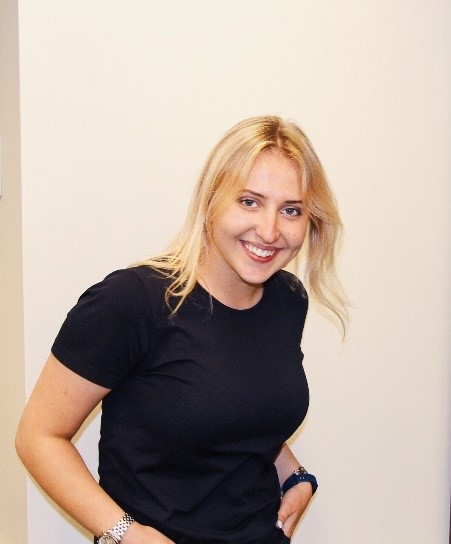Strengthening Cybersecurity in Ukraine – Starting with Students

Nataliia Tusina is currently finishing her bachelor’s degree in Cybersecurity at Kyiv Polytechnic Institute at the National Technical University of Ukraine. Unlike most undergraduate students however, she already has international professional experience in her field of study. In July 2019, Nataliia – along with three other Ukrainian students – won a trip to the U.S. during a hackathon competition hosted by CRDF Global a couple months prior.
The hackathon aimed to strengthen cybersecurity students in the region and hosted over 100 attendees, including students and global cybersecurity experts from the business and the government sectors. Competitors of the hackathon examined cyber vulnerabilities in the model of a “smart house.” The winners of which – including Nataliia Tusina, Pavel Shabarkin, Kostiantyn Vadys, and Maksym Vatsyk – received the opportunity to represent Ukraine at an international hackathon in the United States.
“It is important to make new connections and experiences in cybersecurity, specifically with opportunities in Capture the Flag (CTF), as it pushes you and reflects real computer science challenges,” said Nataliia. CTF refers to a specific type of cybersecurity competition designed to challenge its participants to solve computer security problems and capture and defend computer systems.
Nataliia was surprised by her win at the hackathon but was equally excited for the opportunity to partake in a world-renowned cybersecurity bootcamp at an American university. Nataliia traveled alongside the other hackathon winners to participate in the “Cyber Bootcamp and Challenge on Audit Controls,” hosted by the Center for Education and Research Information Assurance and Security (CERIAS) at Purdue University. In a fast-paced and purposefully challenging week, Purdue demonstrated its state-of-the-art facilities, programs, and dedicated staff.
Part of what made this workshop unique was its emphasis on teacher-to-teacher collaboration. Ukrainian and Purdue professors participated in several breakout sessions that focused on identifying cybersecurity best teaching practices in class curriculums. From designing learning objectives and desired outcomes for classes, such as “Auditing” and “Cybersecurity Controls,” to discussing how to best teach generally challenging concepts – including intrusion detection systems – the teachers benefitted from this workshop just as much as their students.
Ukrainian Professor Tamara Radivilova was amazed by the work displayed by the Purdue Computer Science staff. “We’ve seen so much research here and got to meet all the staff that are doing research to better cybersecurity teaching practices. They are doing great research and finding results. I hope we will continue to have collaboration with universities like Purdue,” she said.
While the professors collaborated to improve teaching in cybersecurity, the students participated in an interactive challenge, much like the Ukrainian hackathon. In this challenge, Ukrainian and Purdue students split into four teams and collaborated to prevent threat intelligence hacks. Students earned a variety of points depending on which skills they engaged to determine the winning team. For some students, this simulation introduced entirely new cyberthreats.
Purdue faculty and staff also offered special tours for their visitors to explore their Cyber Forensics Program/Lab (KNOY), Visual Analytics for Command and Control in an Interoperability Environment (VACCINE), International Biometrics Standards and Testing Lab, and the Birck Nanotechnology Center.
So, why cybersecurity? Why is it so important for students to learn?
“Cybersecurity is a great challenge for people interested in the future of technologies. We must create a secure and protected space, because the next war will not be fought with weapons, but with information. Therefore, I think this is the work we need to be learning right now in order to secure our information and our futures,” Nataliia explained.
“A cybersecurity expert is not an expert just in one part of cybersecurity. We need to know every part just to have a full map in our brains to do our job correctly. This experience has helped me expand my knowledge and capabilities in cybersecurity. For that, I am ever grateful. Thank you, CRDF for this opportunity!”
Ukrainian professors were also very pleased with this experience and the outcomes of CRDF Global’s work in cybersecurity. Professor Tamara Radivilova said “I hope we have continued collaboration like this experience. I also want more students to stay in school to research in our country. I hope we will make smarter curriculums for our students and use this experience to our advantage and learn from it. CRDF has been very helpful, because Ukraine students and professors are here now and taking part in CTF and are very happy. They are preparing, discussing, and learning, which is quite wonderful to witness and be part of.”



